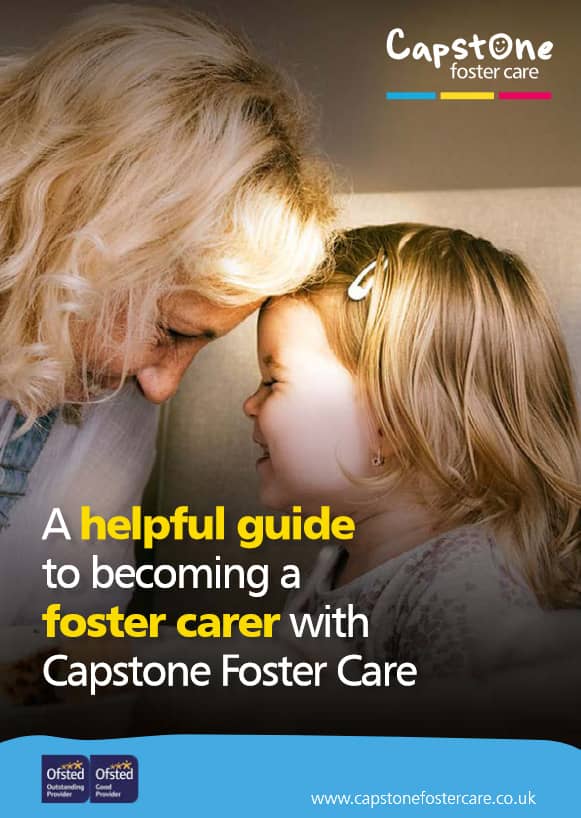


Fostering a disabled child
The role of an independent fostering agency
How to choose a foster care agency
Can I choose who I foster?
What are the benefits of fostering with an independent fostering agency?
What happens when a child is taken into care?
Fostering process: what happens on an initial home visit?
Fostering with local authority vs independent agency
A complete guide to becoming a foster carer
How Are Children in Foster Care Matched with Carers?
Foster Care Budgeting Tips
Becoming A Foster Carer
What is a Care Leaver?
What is a Foster Carer?
Fostering Regulations
How long does it take to become a Foster Carer?
What are the Foster Care requirements?
Changing IFA - Transferring to Capstone
8 reasons why a child may be taken into care
Fostering as a Career
Can you foster if you smoke or vape?
A guide to fostering assessments
LGBTQ+ Fostering
Equality, Inclusion & Anti-discriminatory Practice in Foster Care
What can disqualify you from foster care?
Can you foster if you’re on benefits?
Top transferable job skills to become a foster carer
Fostering as a same sex couple
Fostering while renting
Can you foster if you have mental health issues?
Is there an age limit for fostering in the UK?
Do foster carers get a pension?
How to foster a child: A step by step guide
How do DBS Checks Work?
Can I foster if...?
Mythbusting the top 10 Foster Care Myths
Can I foster if I am disabled?
LGBT Fostering Mythbusting
Can I foster if I have pets?
Can I Foster A Child?
Can I Foster and Work?
Can you Foster with a Criminal Record
Can Single People Foster?
LGBT Family and Foster Care
Fostering across Cultures
Muslim Fostering
Christian Foster Care
Sikh Fostering
Empty Nest Syndrome and Foster Care
Can I Foster?
What is the difference between residential care and foster care?
Fostering Babies and Young Children
What is Kinship Care?
Fostering Babies - Myths
Focusing on Parent & Child Fostering
Fostering Siblings
Fostering Teenagers
Fostering Teenagers - Breaking down the Myths
Fostering Unaccompanied and Asylum Seeking Children
Mother and Baby Foster Placements
Private Fostering
How does therapeutic fostering work?
Young Children Fostering Placements
Difference between short and long-term fostering
Types of self-harm
A Guide to the Foster Care Handbook
Reunification and Birth Parents: A Guide for Foster Carers
What is an EHC Plan? A Guide for Foster Carers
How to prepare a child for becoming a care leaver
Children who foster: impact of fostering on birth children
Fostering LGBTQ+ Youth
How to prepare your home for a foster child
How to help a lonely child: A Guide for Foster Carers
What are the National Minimum Standards for Fostering Services?
10 tips for foster children's education
How to prepare your foster child for secondary school
Tips for coping when foster placements end
Tips for foster parents during Coronavirus
What happens if foster parents get divorced?
5 ways to manage Mother's Day with foster children
Tips for managing foster children's bedtime routines
How to handle foster child bullying
Fostering allowances and the gender pay gap
What discounts can foster carers get?
How to adopt from Foster Care
5 ways to manage Father's Day for children in foster care
8 most common fostering challenges
FosterTalk Membership with Capstone Foster Care
Supporting foster children's contact with birth families
A guide to independent fostering
Keeping Children Safe Online: A Guide For Foster Carers
Movies About Foster Care
Play-based learning strategies for foster carers
A Guide to the Staying Put Program
Why Foster Parent Wellbeing Matters
How to deal with empty nest syndrome
How to recognise signs of depression in foster children
Can you take a foster child on holiday?
Tips and advice on fostering with a disability
10 tips on connecting with your Foster Child
Fostering vs Adoption - What's the difference?
How Fostering can change a future
How to adopt from Foster Care
How to encourage children to read in Foster Care
How to prepare a Foster Child's bedroom
Reading and Storytelling with Babies and Young Children
Supporting Children's Learning
The 20 most recommended books Foster Carers and young people should read
Things you can do when your children leave home
The impact of early childhood traumas on adolescence and adulthood
Anxious Disorders in Foster Children
What is sexual abuse and sexual violence
Foster Child behaviour management strategies
Foster Parent Advice: What to expect in your first year of fostering
Capstone's twelve tips at Christmas
10 celebrities who grew up in Foster Care
Could Millenials be the solution to the Foster Care crisis?
Do you work in Emergency Services?
Form F Assessor and Assessment Training
Foster Care Fortnight
Improving Children's Welfare - Celebrating Universal Children's Day
New Year - New Career - Become a Foster Carer
Young People Charities
It can bring up many emotions for them and this can mean that children can struggle to manage their emotions and their behavior can deteriorate. There are some simple things that foster carers can do to try and help looked after children cope during this traditional family time. In turn, this will also help to create a happier Christmas for all…
A child in care may have never had their own Christmas stocking or a tree or gifts. They may never have had a Christmas like your own and it’s important for them to understand what is going to happen. Explain your attitude toward Christmas and discuss with them their experiences of Christmas. Be ready to hear about their Christmases and encourage them to share good memories of Christmases past. Let them know that their way of doing Christmas can be integrated into yours.
Most children will do this at home or at school, and this will help a child to confirm that Santa knows where they are going to be if this is their first Christmas with you.
Consider this time of year to be emotional for the children and young people you support especially for some children who may not be able to see their family or may be worried for the welfare of parents or siblings. The emphasis on Christmas might make some children feel like outsiders in their foster home. It’s a delicate situation and a real effort should be made to ensure that the child feels treated on a par with the other children in the household.
Children thrive on routine and maintaining this will help children to cope. If a routine cannot be maintained, organise and arrange a Christmas calender ahead of each activity to help the young people to prepare. Talk through any worries and coping strategies for those circumstances which you know young people struggle. It’s always important to ask them what they may like to do and who they would like to see.
Until you know your young person well and how they cope it can be better to limit visitors to manageable levels. If you include friends in your festivities, talk about them to the children you support. The more they know about who will be visiting, the less difficult it will be for them to relax amongst strangers.
Think about children who have witnessed the misuse of alcohol and drugs. This could cause anxieties for children if they are aware people will be drinking at home. To avoid children from getting scared prepare them with the concept that people may drink alcohol and this will be done in a respectful and responsible manner.
Children who have not had much experience of Christmas and presents may find lots of presents and attention too much pressure for them. To help, spread out present giving. It doesn’t matter if presents are still being opened over the Christmas holiday.
Avoid putting pressure on children to react in the ‘right’ way. Children in care often have feelings of unworthy and undeserving this makes it really hard for them to accept praise, gifts and rewards.
Organise contact with parents and siblings as close to Christmas day as possible. A lack of contact over Christmas might cause a child in care to worry about their parents, grandparents or siblings. By working closely with a child’s social worker, a phone call on Christmas day might be arranged, and the child’s birth family can support a child to enjoy Christmas, without worrying about them or feeling guilty.
Respect a child’s culture and diversity. Celebrate their customs and religions as well as your own. Try to include something from the foster child’s own ‘Christmas traditions’. There is likely to be something they did at home that is important to them. It might be as simple as helping them to make a card for mum.
Small things such as having their names on their own Christmas stockings and making it clear that these are their stockings to keep for next Christmas increases the message that they are a part of the festivities. It helps to make a point of doing something special with each child in the house. Each child can have a special Christmas related duty. This gives you some one-on-one with each child and allows them to feel involved and somewhat special.
Some children may have concerns about whether there will be enough food. Let them help you shop for groceries for the Christmas meals. This will give them the opportunity to tell you what they like or don’t like or never ate.
Children can be placed 24/7, 365 days a year, with fostering families and the Christmas period is no exception. As a foster carer it’s always worthwhile to have additional supplies and gifts – just in case. These are also useful for any guests who pop over during Christmas, who may overlook buying a gift for any additional children you might be looking after.
If you’ve got any questions or would like to find out more about fostering with Capstone, fill out the form below.
An experienced fostering advisor from your local area will then be in touch.

Start the conversation today. Our team of friendly advisors are on hand to answer any foster care questions you may have. We can offer you honest and practical advice that can help you decide if becoming a foster carer is the right path for you.


